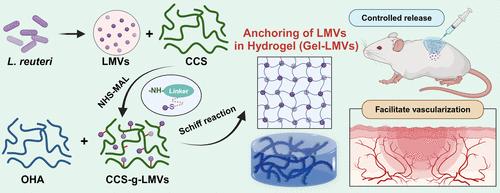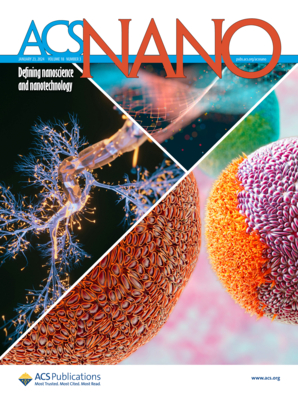Anchoring of Probiotic-Membrane Vesicles in Hydrogels Facilitates Wound Vascularization
IF 16
1区 材料科学
Q1 CHEMISTRY, MULTIDISCIPLINARY
引用次数: 0
Abstract
Inadequate vascularization significantly hampers wound recovery by limiting nutrient delivery. To address this challenge, we extracted membrane vesicles from Lactobacillus reuteri (LMVs) and identified their angiogenic potential via transcriptomic analysis. We further developed a composite hydrogel system (Gel-LMVs) by anchoring LMVs within carboxylated chitosan and cross-linking it with oxidized hyaluronic acid through a Schiff base reaction. The resulting Gel-LMVs exhibit good biocompatibility and retain the bioactivity of LMVs, which are released in a controlled manner to stimulate cell proliferation, migration, and angiogenesis in vitro by modulating gene expression in critical signaling pathways. Moreover, in an in vivo model, Gel-LMVs upregulate vascular endothelial growth factor (VEGF) and platelet endothelial cell adhesion molecule (CD31), leading to accelerated vascularization in early healing stages, while concurrently reducing inflammation and augmenting collagen deposition to enhance wound healing quality. This approach to functionalizing biomaterials with probiotic-MVs offers an advanced strategy for wound healing.

水凝胶中益生菌膜囊泡的锚定有助于伤口血管化
血管生成不足会限制营养输送,从而严重阻碍伤口恢复。为了应对这一挑战,我们提取了饲用特异性乳酸杆菌(LMVs)的膜囊泡,并通过转录组分析确定了它们的血管生成潜力。我们进一步开发了一种复合水凝胶系统(Gel-LMVs),将 LMVs 固定在羧化壳聚糖中,并通过希夫碱反应与氧化透明质酸交联。由此产生的凝胶-LMVs 具有良好的生物相容性,并保留了 LMVs 的生物活性。LMVs 以可控方式释放,通过调节关键信号通路中的基因表达,在体外刺激细胞增殖、迁移和血管生成。此外,在体内模型中,Gel-LMVs 还能上调血管内皮生长因子(VEGF)和血小板内皮细胞粘附分子(CD31),从而在早期愈合阶段加速血管生成,同时减轻炎症反应,促进胶原蛋白沉积,提高伤口愈合质量。这种用益生菌-MVs 对生物材料进行功能化的方法为伤口愈合提供了一种先进的策略。
本文章由计算机程序翻译,如有差异,请以英文原文为准。
求助全文
约1分钟内获得全文
求助全文
来源期刊

ACS Nano
工程技术-材料科学:综合
CiteScore
26.00
自引率
4.10%
发文量
1627
审稿时长
1.7 months
期刊介绍:
ACS Nano, published monthly, serves as an international forum for comprehensive articles on nanoscience and nanotechnology research at the intersections of chemistry, biology, materials science, physics, and engineering. The journal fosters communication among scientists in these communities, facilitating collaboration, new research opportunities, and advancements through discoveries. ACS Nano covers synthesis, assembly, characterization, theory, and simulation of nanostructures, nanobiotechnology, nanofabrication, methods and tools for nanoscience and nanotechnology, and self- and directed-assembly. Alongside original research articles, it offers thorough reviews, perspectives on cutting-edge research, and discussions envisioning the future of nanoscience and nanotechnology.
文献相关原料
公司名称
产品信息
麦克林
Sodium periodate (NaIO4)
 求助内容:
求助内容: 应助结果提醒方式:
应助结果提醒方式:


